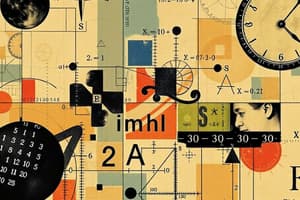Podcast
Questions and Answers
Arithmetic deals with the basic operations of numbers: addition, subtraction, multiplication, and ______.
Arithmetic deals with the basic operations of numbers: addition, subtraction, multiplication, and ______.
division
Fractions are used to represent parts of a whole, a proportion, or a ______.
Fractions are used to represent parts of a whole, a proportion, or a ______.
ratio
Decimals are a means of representing fractions with a base of ______ denoted by the decimal point.
Decimals are a means of representing fractions with a base of ______ denoted by the decimal point.
10
Ratios are a comparison between two quantities, expressed in the form of a ______.
Ratios are a comparison between two quantities, expressed in the form of a ______.
Percentages are a way to express a part of a whole as a ______ of 100.
Percentages are a way to express a part of a whole as a ______ of 100.
Fractions can be simplified or expressed as ______ numbers.
Fractions can be simplified or expressed as ______ numbers.
Ratios can also be used to describe the relationship between two variables, such as the ratio of output to input in a ______ process
Ratios can also be used to describe the relationship between two variables, such as the ratio of output to input in a ______ process
Percentages are often used in real-world situations, such as calculating sales tax, interest rates, or the probability of an ______ occurring
Percentages are often used in real-world situations, such as calculating sales tax, interest rates, or the probability of an ______ occurring
Understanding these fundamental ______ concepts prepares you for real-world problems and situations
Understanding these fundamental ______ concepts prepares you for real-world problems and situations
When you go grocery shopping, you might need to calculate the cost of an item with a price displayed in dollars and ______
When you go grocery shopping, you might need to calculate the cost of an item with a price displayed in dollars and ______
If you're planning a party, you might need to calculate the ratio of guests invited to seating available in your ______
If you're planning a party, you might need to calculate the ratio of guests invited to seating available in your ______
By building a strong understanding of these topics, you'll be well-prepared to tackle more complex mathematical challenges as you continue your ______
By building a strong understanding of these topics, you'll be well-prepared to tackle more complex mathematical challenges as you continue your ______
Flashcards are hidden until you start studying
Study Notes
Math Foundations: Arithmetic, Fractions, Decimals, Ratios, and Percentages
Math is a universal language that empowers us to understand and navigate the world around us. In this exploration, we'll delve into some fundamental math concepts—arithmetic, fractions, decimals, ratios, and percentages. These building blocks will provide a foundation for more advanced mathematical concepts as you continue your journey.
Arithmetic
Arithmetic is the branch of mathematics that deals with the basic operations of numbers: addition, subtraction, multiplication, and division. These operations are essential for performing calculations and solving problems involving whole numbers, natural numbers, integers, rational numbers, and real numbers.
Fractions
Fractions are used to represent parts of a whole, a proportion, or a ratio. They are written in the form of a numerator and a denominator, separated by a line (fraction bar) or a forward slash (solidus). Fractions can be simplified or expressed as mixed numbers (whole numbers with a fractional part).
Decimals
Decimals are a means of representing fractions with a base of 10 (denoted by the decimal point). They are commonly used in everyday life for measuring and price calculation. Decimals can be rounded or truncated to approximate or simplify values.
Ratios
Ratios are a comparison between two quantities, expressed in the form of a fraction. Ratios can also be used to describe the relationship between two variables, such as the ratio of output to input in a process or the ratio of males to females in a population.
Percentages
Percentages, or percent, are a method for representing proportions or fractions as a percentage of 100. Percentages are often used in real-world situations, such as calculating sales tax, interest rates, or the probability of an event occurring.
Real-World Applications
Understanding these fundamental math concepts prepares you for real-world problems and situations. For example, when you go grocery shopping, you might need to calculate the cost of an item with a price displayed in dollars and cents (decimals). Or, if you're planning a party, you might need to calculate the ratio of guests invited to seating available in your home. Or, if you're working on a budget, you might need to convert percentages of your income into dollars and cents.
Challenges and Tips
Like any subject, math can be challenging, especially when you're first learning these fundamental concepts. Here are some tips to help you overcome these challenges:
- Break down problems into smaller, easier-to-understand parts.
- Use visual aids, such as diagrams or number lines, to help you conceptualize ideas.
- Practice, practice, practice! The more you work with these concepts, the more comfortable you'll become with them.
- Seek help from a teacher, tutor, or friend if you're stuck on a problem.
Conclusion
Arithmetic, fractions, decimals, ratios, and percentages are foundational math concepts that provide a strong foundation for more advanced mathematical topics. These concepts are used in everyday life and are essential for understanding the world around us. By building a strong understanding of these topics, you'll be well-prepared to tackle more complex mathematical challenges as you continue your education.
Studying That Suits You
Use AI to generate personalized quizzes and flashcards to suit your learning preferences.




